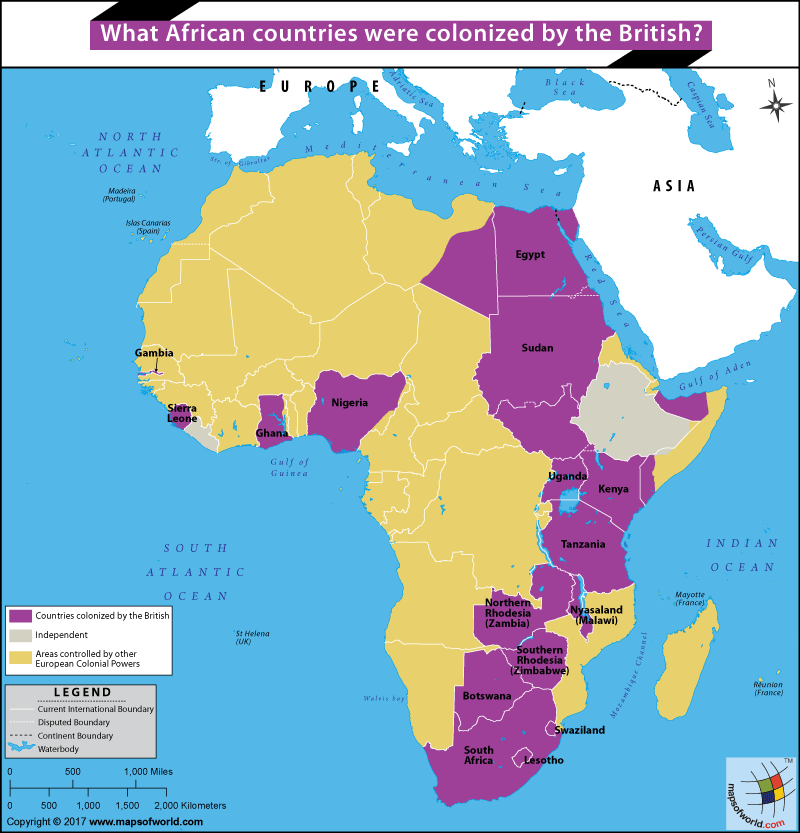What African countries were Colonized by the British?
Britain’s colonial ambition attacked Africa from all sides with the aim of ruling the continent with complete supremacy. In the west, it ‘acquired’ Gambia, Ghana, Nigeria, Southern Cameroon, and Sierra Leone; in the east, Kenya, Uganda, and Tanzania were under Britain rule; and in the south, Britain successfully overtook South Africa, Zambia, Zimbabwe, Malawi, Lesotho, Botswana, and Swaziland. Egypt was also under colonialism, but it did have a unique history with Britain. (we’ll get to this in a minute) And lastly, Sudan was jointly ruled by Egypt and Britain, because they had jointly colonized the area.
The Berlin Conference of 1884 – 1885, is considered the defining event in the ‘scramble for Africa,’ or the partition (or conquest) of Africa. By 1871, Britain had established crown colonies in Gambia, Sierra Leone, Lagos, and the Cape and Natal provinces in South Africa.
By 1844, British officials had signed treaties with Fante chiefs that were demanding equal rights. These treaties greatly enhanced British economic interests, and by the 1870s, they monopolized trade in the region. In 1874 the British colonized the coastal Fante states but didn’t conquer Ashanti (Asante) until 1901.
Continuing its expansion in western Africa, the British established colonialism in Nigeria and declared Lagos its protectorate in 1851. The Royal Niger Company was granted a charter to help advance the political and economic interests of the British in the Niger Delta region. But by 1900, was the entire country under formal British colonial rule.
As noted, with respect to Egypt, there is a unique history that dates back to 1875, when Britain increased its influence in Egypt by acquiring a substantial share in the Suez Canal. Safeguarding the canal became a major endeavor of the British government. The Egyptian economic recession and debts gave the British government the chance to increase its military involvement, and subsequently suppressed the Ahmed Urabi revolt, and enforce complete colonialism control over Egypt in 1882. With Egypt totally under British control, this made it simple to jointly take on the colonization of Sudan. But the Anglo-Egyptian forces met stiff resistance from the Mahdi forces in Sudan, and it wasn’t until the 1890s, that the country succumbed to British control.
In the eastern region, Uganda formerly ‘acquired’ in 1894, and Kenya formerly ‘acquired’ in 1895, and brought under British rule through the East Africa Company, which was instrumental in channelizing this colonialism.
The British colonization of the Cape Colony, between 1802 and 1806, was significant in the context of its imperial interests in India. Earlier a Dutch colony, the Cape was taken over by the British, who made it a port of call for their ships en route to India. It was the discovery of gold and diamonds, eight decades later that forced Britain to get directly involved in southern Africa with an agenda to control the economic and political destiny of the region.
The credit for the southern conquests could be given to Cecil Rhodes, who was one of the great British empire-builders in Africa. Botswana, Zambia, Zimbabwe, and Malawi, in the south of Africa, were his achievements. The African communities, especially the Shona and Ndebele, fiercely resisted the conquest of their lands in central Africa. The provinces of Cape Colony, Natal, Orange Free State, and the Transvaal, were unified to form the Republic of South Africa, which was granted autonomy, and thus became self-governing in 1910. It wasn’t until 1994, that the whites-dominated political system, and Apartheid, were dismantled, and true democracy was installed, paving the way for the election of the country’s first black president, Nelson Mandela.
Related Links:
- Why did British Empire Collapse?
- What countries were never invaded by Britain?
- What are the 13 Original Colonies?
Related Maps:
















